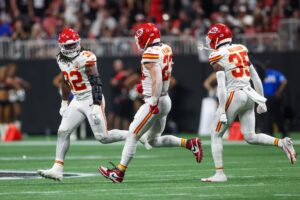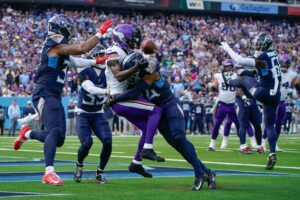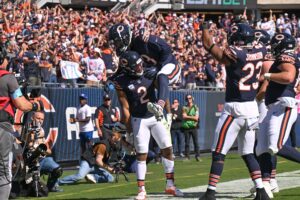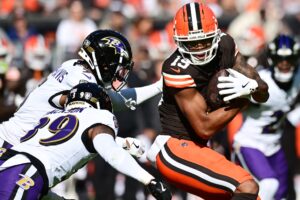Dallas Cowboys quarterback Dak Prescott is up for an extension, and he’s about to break the bank. While nobody knows exactly how much he’ll make, eventually the Cowboys will sign him to a long-term deal. According to various reports, Prescott is looking for a deal similar to what Russell Wilson just received from the Seattle Seahawks. This may sound ridiculous to some, as Prescott isn’t nearly the quarterback that Wilson is.
Or is he? While 2018 Russell Wilson is clearly better than 2018 Dak Prescott, 2018 Dak Prescott actually matches up well with 2014 Russell Wilson. When looking at the two players, Prescott’s first three years are remarkably similar to Russell Wilson’s. This isn’t to say that Prescott is as good as Wilson (he’s not), but he’s clearly a franchise quarterback deserving of a new contract.
Dak Prescott, Russell Wilson Notably Similar In Early-Career Work
Prescott and Wilson have similar origin stories, as both players entered the league as mid-round draft picks. Wilson joined Seattle as a third-round pick and beat out free-agent signee Matt Flynn for the Week One starting job. Prescott, meanwhile, took over for an injured Tony Romo and never looked back.
Both players weren’t supposed to start out of the gate as rookies, yet both players enjoyed a great amount of success during their first three seasons. Wilson was a remarkably efficient passer, completing 63.4% of his passes for 9,950 yards, 72 touchdowns, 26 interceptions, and 6.93 ANY/A (that’s good). Additionally, Wilson added on another 1,877 rushing yards and 11 touchdowns on 308 scrambles.
Prescott’s numbers aren’t quite that good, but they’re easily comparable. Since entering the league, Prescott has completed 66.1% of his passes for 10,876 yards, 67 touchdowns, 25 interceptions, and 6.56 ANY/A. Basically, the difference between Wilson and Prescott is the difference between Peyton Manning and Matt Ryan. Nobody thinks Ryan is as good as Manning, but Ryan is still one of the best quarterbacks of his time, and any franchise would love to have him.
Judging a quarterback on wins alone is dangerous, as football is a team sport and one player cannot singlehandedly determine an outcome. However, quarterbacks easily have the biggest impact on winning and losing, so you cannot completely ignore the win-loss column. Wilson went 36-12 over the first three years of his career, won Super Bowl 48 and came one yard short of winning Super Bowl 49. While Prescott has yet to win a Super Bowl, his 32 wins since 2016 are the most by any NFC quarterback.
Similar Situations
The numbers are similar, but Wilson and Prescott’s parallels run deeper than just the stat sheet. During Wilson’s first three years in the league, Seattle ran their offense through the powerful legs of Marshawn Lynch. Lynch’s physical play allowed Seattle to control the time of possession while the Legion of Boom eviscerated opposing offenses. Because of this, Wilson wasn’t asked to do much, so his numbers were never truly special early in his career.
Prescott is in a similar situation. Marshawn Lynch was one of the best running backs of his time, but Ezekiel Elliott is one of the best running backs of all-time. Because of Elliott’s great rushing prowess, Dallas has primarily been a run-first offense. Just like with Wilson, Prescott’s numbers have remained relatively pedestrian due to Elliott’s rushing ability and the Cowboys’ strong defense.
Lynch broke down in 2015 and Wilson took on a bigger role in Seattle’s offense. The former third-round pick thrived with the increased responsibility, recording 15,674 passing yards, 124 touchdowns, 37 interceptions, and 6.97 ANY/A over the next four seasons. Wilson elevated his game without Lynch and carried several subpar rosters to the playoffs over the past few seasons.
Prescott has the potential to do the same thing. Elliott is still in the prime of his career, but he’s holding out for a new contract. The Cowboys already have to pay Prescott, Amari Cooper, Jaylon Smith, and Byron Jones, so they don’t have the capital to bring everyone back on second contracts. Elliott needs to be the one to go, as he’s the most replaceable of the bunch. The Cowboys are 4-0 in their last four games without Elliott, largely thanks to Prescott’s efforts. During those games, Prescott has thrown for 1,033 yards, nine touchdowns, and just two interceptions. He has what it takes to elevate his game without an elite rushing attack, and should be compensated as such.
What Type of Contract Does Dak Deserve?
If we’re using Russell Wilson as the comparison, then it’s only fitting to look at his first contract extension. Back in 2015, Wilson signed a four-year, $87.6 million contract with Seattle, ensuring he’d be the franchise passer of the future. This deal paid him an average of $21.9 million per year, which is obviously well below Prescott’s asking price. However, it’s also important to note that the salary cap has risen exponentially since Wilson signed his deal. With a larger cap comes larger contracts, so let’s look at how this extra spending space affects Prescott.
According to CBS Sports, the salary cap was $143.28 million in 2015 and has risen to $188.2 million for the 2019 season. This 31.4% rise in available spending capital means that Wilson’s $21.9 million average salary in 2015 roughly correlates to a $28.77 million annual salary in 2019.
That’s not going to be enough to get Prescott. Wilson signed for considerably less than he could have gotten on the open market, and Prescott appears to want top dollar. Carson Wentz just signed a four-year, $128 million extension, and Prescott wants to beat that $32 million annual value. Varying reports have claimed Prescott wants $40 million per year, and he’s not worth that. However, if the Cowboys can get Prescott for $33-34 million a year, history shows he’s well worth the money.
Main photo:
Embed from Getty Images






